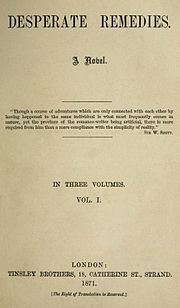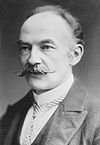- Desperate Remedies
-
For the 1993 New Zealand film, see Desperate Remedies (film).
Desperate Remedies 
First edition title pageAuthor(s) Thomas Hardy Country United Kingdom Language English Genre(s) Novel Publisher Tinsley Brothers Publication date 1871 Media type Print (Hardcover) ISBN NA Desperate Remedies is a novel by Thomas Hardy, published anonymously by Tinsley Brothers in 1871.
Contents
Plot summary
This brilliant but neglected novel - the first that Hardy ever published - not only rivals the detective fiction of Wilkie Collins but bears the undoubted imprint of the mature Hardy. It treats the darker aspects of human passion as well as the innocence of young love, especially from the woman's point of view. It is a tale of 'mystery, entanglement, surprise, and moral obliquity', in which Cytherea Graye, beloved by a young architect, Edward Springrove, is forced by poverty to accept a post as lady's maid to the eccentric Miss Aldclyffe, the woman whom her father had loved but had been unable to marry. Miss Adclyffe's machinations, the discovery that Edward is already engaged to a woman whom he does not love, and the urgent need to support a sick brother drive Cytherea to accept the hand of Aeneas Manston, Miss Adclyffe's illegitimate son, a passionate villain, whose first wife is believed to have perished in a fire. The consequences of this union and the amazing denouement make for one of Hardy's most readable and compelling novels.
Publishing History
After Hardy had trouble publishing his first novel, he was told to "attempt a novel with a purely artistic purpose, giving it a more 'complicated' plot than was attempted with his first, unpublished novel." The publication of Desperate Remedies was Hardy's breakthrough, and the first of a long string of novels that propelled him to the forefront of Victorian letters.[1]
Criticism
Some critics cite "quasi-gothic" elements in Desperate Remedies. It was fairly reviewed in the Athenaeum and Morning Post. However, the review in the Spectator butchered Hardy and his work, calling the book "a desperate remedy for an emaciated purse" and that the unknown author had "prostituted his powers to the purposes of idle prying into the way of wickedness."[2] Hardy wrote of the review, "alas...the Spectator brought down its heaviest leaded pastoral staff on the prematurely happy volumes...the bitterness of that moment was never forgotten, at that moment I wished I was dead."[3]
References
External links
- Desperate Remedies Full text at Google Books
- Desperate Remedies at Project Gutenberg
-
Works by Thomas Hardy Novels The Poor Man and the Lady (1867) · Desperate Remedies (1871) · Under the Greenwood Tree (1872) · A Pair of Blue Eyes (1873) · Far from the Madding Crowd (1874) · The Hand of Ethelberta (1876) · The Return of the Native (1878) · The Trumpet-Major (1880) · A Laodicean (1881) · Two on a Tower (1882) · The Mayor of Casterbridge (1886) · The Woodlanders (1887) · Tess of the d'Urbervilles (1891) · Jude the Obscure (1895) · The Well-Beloved (1897)

Short story collections Wessex Tales (1888) · A Group of Noble Dames (1891) · Life's Little Ironies (1894) · A Changed Man and Other Tales (1913)
Poetry collections Wessex Poems and Other Verses (1898) · Poems of the Past and Present (1901) · Time's Laughingstocks (1909) · Satires of Circumstance (1914) · Moments of Vision (1917) · Late Lyrics and Earlier with Many Other Verses (1922) · Human Shows, Far Phantasies, Songs and Trifles (1925) · Winter Words in Various Moods and Metres (1928)
Individual poems "The Photograph" (1890) · "The Convergence of the Twain" (1915) "The Darkling Thrush" (1901)
Plays The Dynasts (1904–1908)
Categories:- British novels
- 1871 novels
- Novels by Thomas Hardy
- Works published anonymously
- 19th century novel stubs
Wikimedia Foundation. 2010.
